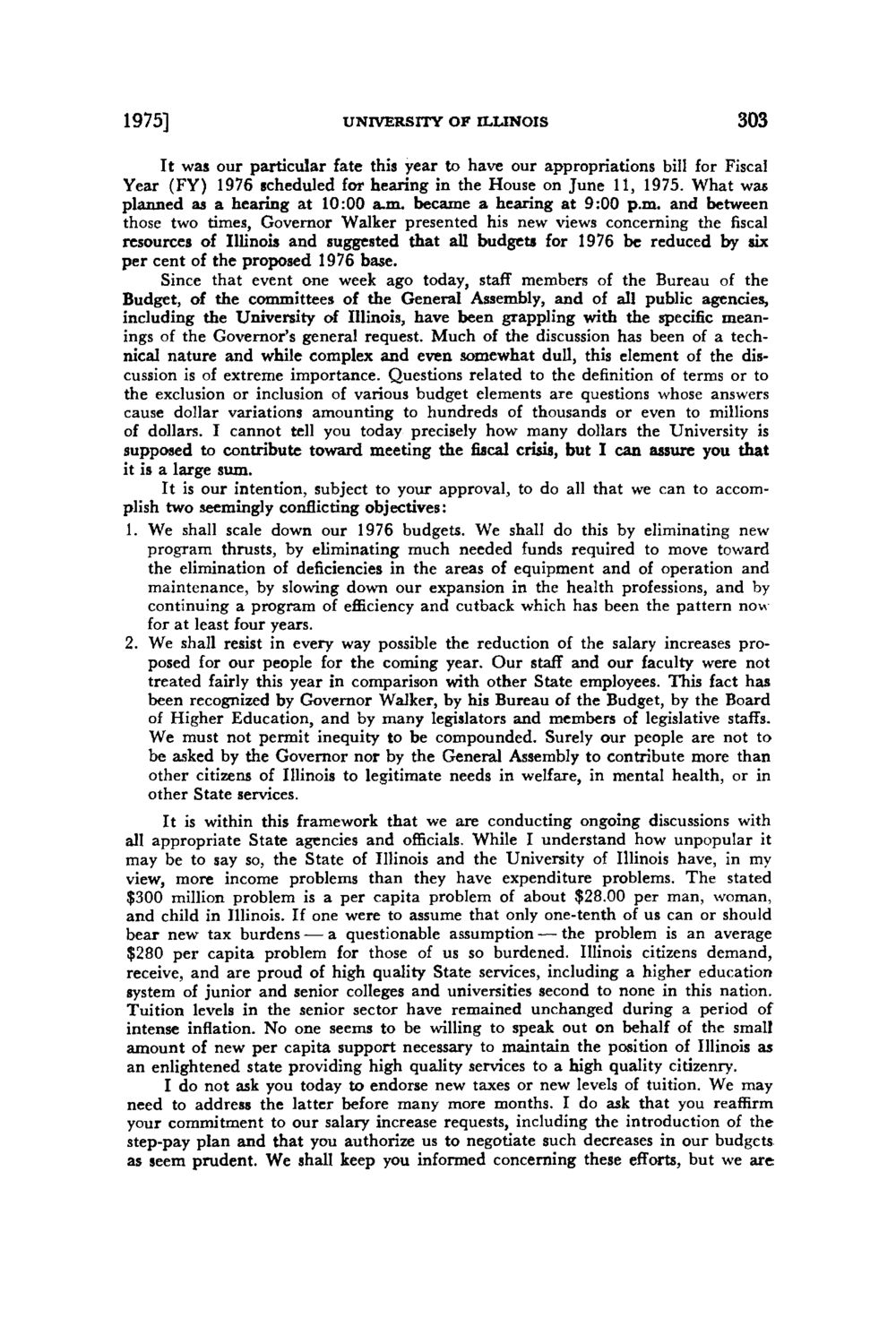| |
| |
Caption: Board of Trustees Minutes - 1976
This is a reduced-resolution page image for fast online browsing.

EXTRACTED TEXT FROM PAGE:
1975] UNIVERSITY OF ILLINOIS 303 I t was our particular fate this year to have our appropriations bill for Fiscal Year (FY) 1976 scheduled for hearing in the House on June 11, 1975. What was planned as a hearing at 10:00 a.m. became a hearing at 9:00 p.m. and between those two times, Governor Walker presented his new views concerning the fiscal resources of Illinois and suggested that all budgets for 1976 be reduced by six per cent of the proposed 1976 base. Since that event one week ago today, staff members of the Bureau of the Budget, of the committees of the General Assembly, and of all public agencies, including the University of Illinois, have been grappling with the specific meanings of the Governor's general request. Much of the discussion has been of a technical nature and while complex and even somewhat dull, this element of the discussion is of extreme importance. Questions related to the definition of terms or to the exclusion or inclusion of various budget elements are questions whose answers cause dollar variations amounting to hundreds of thousands or even to millions of dollars. I cannot tell you today precisely how many dollars the University is supposed to contribute toward meeting the fiscal crisis, but I can assure you that it is a large sum. It is our intention, subject to your approval, to do all that we can to accomplish two seemingly conflicting objectives: 1. We shall scale down our 1976 budgets. We shall do this by eliminating new program thrusts, by eliminating much needed funds required to move toward the elimination of deficiencies in the areas of equipment and of operation and maintenance, by slowing down our expansion in the health professions, and by continuing a program of efficiency and cutback which has been the pattern now for at least four years. 2. We shall resist in every way possible the reduction of the salary increases proposed for our people for the coming year. Our staff and our faculty were not treated fairly this year in comparison with other State employees. This fact has been recognized by Governor Walker, by his Bureau of the Budget, by the Board of Higher Education, and by many legislators and members of legislative staffs. We must not permit inequity to be compounded. Surely our people are not to be asked by the Governor nor by the General Assembly to contribute more than other citizens of Illinois to legitimate needs in welfare, in mental health, or in other State services. It is within this framework that we are conducting ongoing discussions with all appropriate State agencies and officials. While I understand how unpopular it may be to say so, the State of Illinois and the University of Illinois have, in my view, more income problems than they have expenditure problems. The stated $300 million problem is a per capita problem of about $28.00 per man, woman, and child in Illinois. If one were to assume that only one-tenth of us can or should bear new tax burdens — a questionable assumption — the problem is an average $280 per capita problem for those of us so burdened. Illinois citizens demand, receive, and are proud of high quality State services, including a higher education system of junior and senior colleges and universities second to none in this nation. Tuition levels in the senior sector have remained unchanged during a period of intense inflation. No one seems to be willing to speak out on behalf of the small amount of new per capita support necessary to maintain the position of Illinois as an enlightened state providing high quality services to a high quality citizenry. I do not ask you today to endorse new taxes or new levels of tuition. We may need to address the latter before many more months. I do ask that you reaffirm your commitment to our salary increase requests, including the introduction of the step-pay plan and that you authorize us to negotiate such decreases in our budgets as seem prudent. We shall keep you informed concerning these efforts, but we are
| |